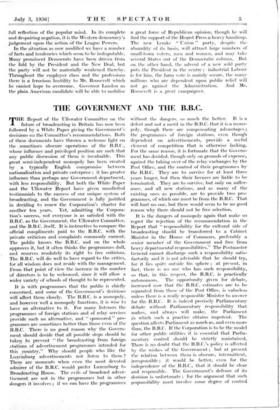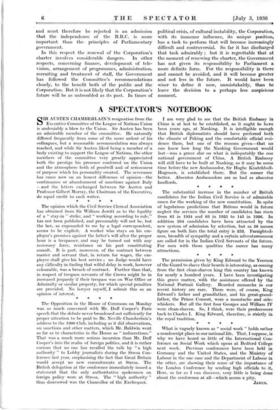THE GOVERNMENT AND THE B.B.C.
THE Report of the Ullswater Committee on the future of broadcasting in Britain has now been followed by a 'White Paper giving the Government's decisions on the Committee's recommendations. Both of these documents have thrown a welcome light on the sometimes obscure operations of the B.B.C., whose influence and privileged position are such that any public discuSsion of them is invaluable. This great semi-independent monopoly has been created by a typically English compromise between nationalisation and private enterprise ; it has greater influence than perhaps any Government department, with less responsibility. But both the White Paper and the Ullswate'r Report have given unsolicited testimonials to the success of our unique system of broadcasting, and the Government is fully justified in deciding to renew the Corporation's charter for another ten years. Yet, admitting the Corpora- tion's success, not everyone is as satisfied with the B.B.C. as the Government, the Ullswater Committee, and the B.B.C. itself. It is instructive to compare the official compliments paid to the B.B.C. with the private criticism and complaints commonly current. The public knows the B.B.C. and on the whole approves it, but it often thinks the programmes dull, and reserves resolutely its right to free criticism. The B.B.C. will do well to have regard to the critics, for all wisdom does not reside with the management. From' that point of view the increase in the number of directorS is to be welcomed, since it will allow a wider Variety of schools of thought to be represented.
It is with programmes that the public is chiefly concerned, and some of the Government's decisions will affect them closely. The B.B.C. is a monopoly, and however well a monopoly functions, it is wise to have an alternative to it. For many listeners the programmes of foreign stations and of relay services provide such an alternative, and " sponsored." pro- grammes are sometimes better than those even of the B.E.C. There is no good reason why the Govern- ment should decide that all possible steps should be taken. to prevent " the broadcasting from foreign stations of advertisement programmes intended for this country." , Why , should people who like the Luxemburg advertisements not listen to them There are moments when even the most devoted admirer of the B.B.C. would prefer Luxemburg to Broadcasting. House. The evils of broadcast adver- tisement are not in the programmes but in .other dangers it involves ; if we can have the programmes without the dangers, so much the better. It is a defect and not a merit in the B.B.C. that it is a mono- poly, . though there are compensating advantages ; the programmes of foreign stations, even though dependent on advertisements, provide a useful element of competition that is otherwise lacking. For the same reason, it is fortunate that the Govern- ment has decided, though only on grounds of expense, against the taking over of the relay exchanges by the Post Office, and the control of their programmes by the B.B.C. They are to survive for at least three years longer, but then their licences are liable to be terminated. They are to survive, but only on suffer- ance, and all new stations, and as many of the existing ones as possible, are to provide two pro- grammes, of which one must be from the B.B.C. That will hurt no one, but there would seem to be no good reason why there should not be free selection.
It is the dangers of monopoly again that make us regret the rejection of the recommendation in the Report that " responsibility for the cultural side of broadcasting should be transferred to a Cabinet Minister in the House of Commons, preferably a senior member of the Government and free from heavy departmental responsibilities." The Postmaster General cannot discharge such a responsibility satis- factorily and it is not advisable that he should try, for it lies quite outside his sphere ; at present, in fact, there is no one who has such responsibility, so that, in this respect, the B.B.C. is practically autonomous. The opportunity given for debate, increased now that the B.B.C. estimates are to be separated from those of the Post Office, is valueless unless there is a really responsible Minister to answer for the B.B.C. It is indeed precisely Parliamentary debate without Parliamentary responsibility that makes, and always will make, the Parliament in which such a practice obtains impotent. The question affects Parliament as much as, and even more than, the B.B.C. If the Corporation is to be the model for other public utilities it is essential that Parlia- mentary control should be strictly maintained. There is no doubt that the B.B.C.'s policy is affected by the wishes of the Government ; but at present the relation between them is obscure, intermittent, irresponsible ; it would be better, even for the independence of the B.B.C., that it should be clear and responsible. The Government's defence of its decision is unfortunate ; for the argument that such responsibility must involve some degree of control and must therefore be rejected is an admission that the independence of the B.B.C. is more important than the• principles of Parliamentary government.
In this respect the renewal of the Corporation's charter involves considerable dangers. In other respects, concerning finance, development of tele- vision, arrangement of programmes, administration, recruiting and treatment of staff, the Government has followed the Committee's recommendations closely, to the benefit both of the public and the Corporation. But it is not likely that the Corporation's future will be as untroubled as its past. In times of political crisis, of cultural instability, the Corporation, with its immense influence, its unique position, has a task to perform that will become increasingly difficult and controversial. So far it has discharged that task admirably ; but it is regrettable that at the moment of renewing the charter, the Government has not given its responsibility to Paxliament a more definite form. For the responsibility is there and cannot be avoided, and it will become greater and not less in the future. It would have been wiser to define it now, unmistakably, than to leave the decision to a perhaps less auspicious moment.















































 Previous page
Previous page